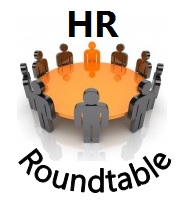As everyone gathered for the September HR (Cincinnati) Roundtable, you could sense optimism because the topic for this month was geared to having a more positive impact than normal. We were getting together to discuss how people can “thrive in their company culture.” To get started the attendees tackled the following questions:
- What factors inhibit or damage a company’s culture?
- How can we sustain a great company culture?
- What can HR do to help people THRIVE?
The attendees eagerly jumped into small groups to start discussing this topic. In fact, it was hard to get them to reconvene to share what they had said. However, we moved things forward and here are their great insights.
1. What factors inhibit or damage a company’s culture?
When data runs the day-to-day: Don’t take this the wrong way. Data, analytics and metrics are key to the success of any company. The challenge occurs when data is the lead to all cultural factors. It depletes, or even eliminates, the fact that humans work there. And, ironically, they are the ones generating the work to get the results and data. A different approach is that data lags. It’s true because data measures what HAS occurred.
Senior leaders are insulated by structure and/or by choice: It’s easy to blame the structure of an organization to state the fact that senior management is designed to not be included with the remainder of the staff. Keep in mind though that some companies design themselves as isolated by choice. It doesn’t work, but it doesn’t take away from the reality that most senior leaders are a separate herd within a company culture.
All talk – no action: This is true in companies from all industries. People express platitudes about how great their culture is, but the behavior of people inside the organization doesn’t match up to what is being proclaimed. When talk and actions don’t pair up together, your culture suffers because people can’t handle the inconsistency.
Fear: This facet had a long run of showing up in literally every HR Roundtable summary for months at a time. It is a good call with this topic because if employees come to work afraid that they’ll lose their job it affects the culture. If people fear potential violence, harassment, or a plethora of other poor behaviors, it affects the culture. There are many more items that could generate fear or uncertainty. Don’t overlook this because fear has a strong influence on culture.
Politics in the office: This isn’t some comment on the national politics that flood our lives with divisive messages from all parties involved. This is much more common and tangible because every company has folks who make moves, decisions and shifts for their own political gain. Politics in the company are going to occur no matter how much you try to contain them. When you have humans involved, you have people jockeying for posture and position.
HR (it had to be said): We have to be honest about this as a profession. One of the biggest throttles on a thriving culture is HR if it’s practiced in the traditional “compliance above all” model. HR doesn’t have to be (and shouldn’t be) a culture inhibitor. However, in many organizations HR is an obstacle that intentionally gets in the way of others. We’ll discuss how this can change later in the notes .
2. How can we sustain a great company culture?
Managers who consistently communicate and are transparent: Some of this may sound idealistic, and that’s okay. It would be a great attribute of a company if it’s leaders and managers excelled in effective communication and were transparent in their actions. If that isn’t the case where you are now, then take it upon yourself to evaluate this and see how you can move to a better state. It’s worth the work to do this.
People are accountable for (and to) the culture: Another ideal, but one that’s worth pursuing. This addressed the point before about having your words and actions align. A key to this is that it has to be more than some pageantry around signing some agreement or document stating everyone will buy-in to the culture. That has never worked. You need to see what this looks like in your organization and then develop a plan for design and test things to see if they can truly be sustained. You have to get past aspirational slogans and build something people can perform to on an on-going basis.
Ask people what they think/feel and then really listen to them: This goes beyond the suggestion box model. Have meaningful conversations with people on a regular basis to gain insight as to how things really are going with them personally, within their department and how they view leadership and the company as a whole. It’s such a better use of time vs. performance management. Have conversations and allow feedback.
3. What can HR do to help people THRIVE?
Act vs. Respond: HR can help people thrive by being intentional and ahead of people issues/circumstances instead of acting like firemen. If the only reason you’re in HR is to put out fires, change professions. The more intentional HR is in how it practices human resources with the employees, the better culture you’ll experience. It’s a fact.
Coach and develop managers and leaders: This can’t be emphasized enough. HR has an obligation to develop people, not measure them. If you want managers and leaders to be accountable, then teach them how that looks. Correct them when they stumble and encourage them often on what they do well. HR has to own this as a normal daily approach and not make it a program.
Evaluate your systems, policies and procedures: You can’t have a culture of “Yes” when your systems are built around “No.” It won’t ever work. HR needs to take the time, and put the work in, to see how their people systems truly impact the people. Too often, we’re more focused on implementation at the sake of all other things. Change this and have systems that support and build the culture you want to have for your company
Expect employees to thrive: We often settle when it comes to our employees. We’re more concerned with them showing up for work vs. being the best performer they can be. HR can change this so that the bar is set high on purpose. Note that it needs to be attainable and sustainable, but set expectations. People want to thrive, but need to know what the framework is in order to reach the expectations.
Practice connection and inclusion: This is far broader than a diversity initiative. Making sure your employees are truly connected will ensure they are engaged. Making sure inclusion is present and a part of the fabric of your company just makes you better as a culture. Again, not a program – a reality.
Develop relationships: HR can’t have a human focus if they’re not willing to develop relationships with people. This goes beyond greeting everyone every day. That should be a natural given to start the day and not the end of some obligatory effort to reach people. Employees want to belong in their role and within the culture of their company. Someone has to reach out to make sure that happens. HR is the one who should own this.
This was a great topic!! Culture is such a driving force in organizations that it felt like we just scratched the surface. I’m sure that we’ll be revisiting different aspects of culture in future Roundtables!!
